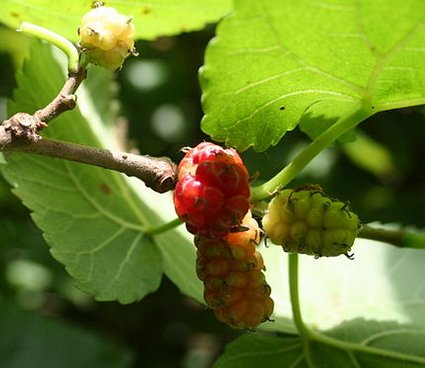Mulberry

  | Mulberry in TCM:Explore the properties of Mulberry according to Chinese
Nutrition and Traditional Chinese Medicine (TCM):
Temperature: cold
Channels: LU, SP, KD, LV
Flavors: sweet
Tonifies: qi, blood, yin
Special Properties:
clears heat, resolves water accumulations, eliminates toxins, resolves dryness
In terms of Traditional Chinese Medicine (TCM) Mulberry is known for its ability to Tonify Qi, Blood, and Yin. It also helps to clear heat, lubricate the lungs, calm spirit, regulate water, and eliminate toxins.
In general the ancient Chinese medical texts cite that it enters the Lung, Spleen, Kidney, and Liver. The flavor of Mulberry is sweet, and it is considered to be slightly cold in temperature.
For constipation drink mulberry juice each day. For insomnia drink 1/2 cup of mulberry tea daily. For cough take 2 teaspoons of mulberry syrup twice daily. This syrup can be made by cooking down mulberries on low heat until they dissolve, adding honey, and cooking down to a thick syrup. Mulberry may also help to alleviate dry mouth, irritability, blurry vision, lymph node enlargement, and back pain due to kidney weakness. [22]
Disclaimer: In accordance with our terms of service, by using this web site you agree that none of the information found on this web site constitutes medical advice. You should always consult your doctor before trying any particular food or herbal remedy to treat disease.
Folk remedies presented on this site are designed to address specifc TCM diagnoses, and are not one-size-fits-all. If you would like to learn more about Traditional Chinese Medicine (TCM) and how it relates to Chinese Nutrition, you can book in a free call with a licensed professional. There is no obligation to purchase.
[CLICK HERE for your free INITIAL CONSULTATION] |

